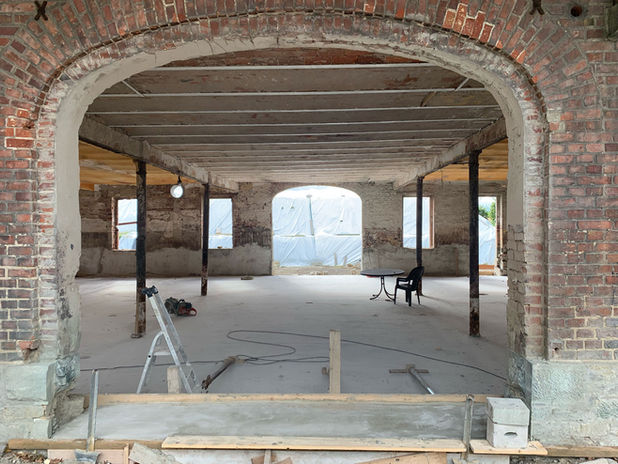farmhaus
Architect:
Carlo Parente Architect
Year:
2020
Location:
Lippetal, North Rhine-Westphalia, Germany

Farmhaus is a historic decommissioned farm structure in the small town of Lippetal, Germany, which has been transformed into a residence for a Canadian-German family. The project explores old and new conditions, using the historical fabric as a launching pad to create a contemporary mixed-use site that combines private and communal spaces. The centrepiece of a master plan to transform a 1920s hog farm into a mixed-use site, Farmhaus includes two apartments in addition to co-working and community spaces for local residents. Occupying the original hog barn, Farmhaus accommodates both the public and the private realms – as one moves south, the programming progresses from a public courtyard to a flexible private residence. This public-private interface is the parti of Farmhaus.
The entrance is carved out of the southeastern portion of the structure, with a private entrance and court. The plan allows for a growing family with four bedrooms, one of which will be a guest suite. The design enables the couple to ‘age in place,’ allowing the residence to shrink and be compartmentalized as the family and their needs change. A separate apartment to be built in a future project phase will be accessible from the public courtyard. The lofted second floor will become a multi-purpose all-season event space accessible from the public courtyard.
The processes undertaken at Farmhaus strive to engage a circular economy by repurposing the existing structure, materials, and systems rather than adding building waste to landfills. The house leverages existing resources, siting, and passive and active systems by using solar photovoltaic and solar hot water panels, a biomass system, rainwater harvesting, and the exposing and reusing existing materials. This project brings new relevance and purpose to the farm's original live-work setting with minimal and sensitive design moves! The farm once formed the backbone of the social (as well as the built) infrastructure in the Lippetal area. Farmhaus is part of a larger agenda to conserve the fabric of this changing farm community and countryside

The Farmhaus project by Carlo Parente is an example of New Wood Open Architecture in demonstrating existing wood structures' immeasurable historical, cultural, economic and environmental value. It also demonstrates how these structures are inherently resilient and flexible, meeting various practical needs throughout their past, present, and future lives. The masonry exterior walls support the intricate wood-frame roof-truss structure above, creating a
unique space below which historically served as a hayloft. By taking this structure and converting it into a dwelling, this project proves the flexibility of the original wood trusses and the value they retain in providing a unique and sustainable dwelling environment. The truss system allows for a reasonably high level of openness in connection with the floor plan below. The
trusses transfer all roof loads towards the exterior masonry wall into the foundation. This layout creates an open floor plan. Spaces can then be influenced by dweller-specific needs and not based on predetermined structural requirements, future-proofing the dwelling, as ongoing changes within the existing structure are more easily accomplished. The Farmhaus project by Carlo Parente exemplifies New Wood Open Architecture by highlighting the retained value of historic wood architecture and by elegantly converting a utilitarian pig barn into a unique, flexible and sustainable dwelling environment.
analysis






























































